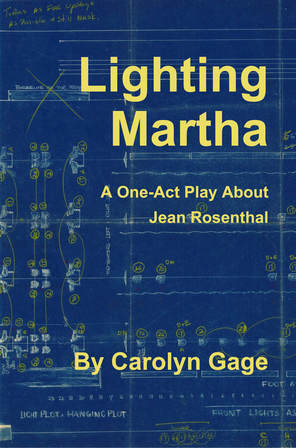Lighting Martha
A One-Act about Jean Rosenthal
Paperback
eBook (PDF)
eBook (EPUB)
Kindle
 The background is from Rosenthal's light plot for Martha Graham's "Errand Into the Maze"
The background is from Rosenthal's light plot for Martha Graham's "Errand Into the Maze"
- 2022, Red Rocks Community College, Lakewood, CO.
- 2021, Constructive Outrage Productions, NYC, online reading.
- 2021, Central Michigan University, Mount Pleasant, MI
- Excerpt included in Best Women's Monologues, 2021 Anthology, published by Smith & Kraus
- 2021, Western Kentucky University, Bowling Green, KY.
- 2020, University of California, Santa Barbara. (postponed by COVIDS)
- 2019 PortFringe, Portland, ME
- Winner, Patron's Choice Award and Spectacular Tech-Tacular Award at PortFringe 2019.
- 2019, University of Alabama, Crimson Stage, Tuscaloosa, AL
- 2019, Reading at the Highlands Inn, Bethlehem, NH and in Portland, ME.
"Miki takes us behind the curtain, revealing the contrast between the joyous grandeur of great art and the painful realities of secret love, illness, jealousy, and loss. Wonderfully written and acted, Lighting Martha packs worlds into 30 minutes..." -- First Look Review, Mark Shaughnessy.
"Carolyn Gage’s play is an important snapshot of the struggles of actual lesbian women and the difficult, secret lives they often lived in the times before our current ‘out and proud’ era."-- First Look Review, majeem.
"This is a heartfelt script abut love, pain, self identity, and the fear of reality."--The Arts Fuse, Portland, ME.
"On a day when we celebrate PRIDE, part of what this play deals with is the pain of not being able to dance in the light with the one you love."--Liz Freeman, "Miki" in PortFringe production.
"This short play encompasses so many intersections, it is thrilling. Like the interplay of light and movement, the relation of star and support person, the tension between work and love..."-- Frieda Werden
The play opens the night of April 30, 1969, after the final dress rehearsal for Martha Graham’s 35th season opener at New York City Center. Legendary lighting designer Jean Rosenthal, dying of cancer, arrived in an ambulance and on a gurney for the final lighting check. She has just left to return to the hospital. Her life partner and lighting assistant, Miki (Marion) Kinsella, is alone on the stage. A lighting technician, Ben, notices her behavior and expresses his concern. Miki is agitated and displacing her anger onto Martha Graham for allowing Jean to attend the rehearsal. Jean has forbidden Miki to talk about her disease or her dying, and Miki’s grief and resentment have reached the breaking point. Ben leaves Miki with a pint of whiskey. She turns on the ghost light, lies down on the stage, and falls asleep.
The ghost of a healthy, younger Jean shows up, and Miki challenges her over what she perceives as excessive loyalty to Martha Graham. Jean’s explanations only exacerbate Miki’s rage, and, in desperation, Jean pulls the plug on the ghost light, retreating to the shadows. In the darkness, the women begin again, and this time, they find a common language—a language of light, for communicating their difficult truths
The play is a reflection on denial and dying, intimacy and artists, seeing and being seen, and—of course—on light.
*Includes the essay, "Notes on Jean Rosenthal’s Approach to Lighting Design" by Mitchell Jakubka, with resource links.
2 women, 40’s and 50’s; 1 man, 60’s
Single set (bare stage)
45 minutes
